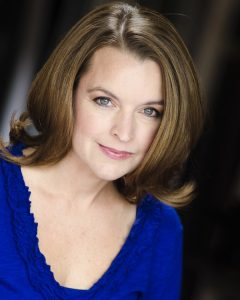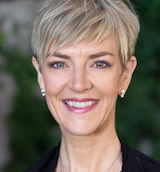This month, Nelson Literary Agency honors one of our own. Rebecca Taylor, our former literary assistant, recently celebrated the release of her debut women’s fiction title, HER PERFECT LIFE (Sourcebooks Landmark, June 2, 2020). We couldn’t wait to talk to her about it and share her words of wisdom and encouragement with you.
Congratulations on the release of HER PERFECT LIFE! Tell us a bit about the book.

It’s about two adult sisters, Eileen and Clare, and their very different lives. Eileen is an overwhelmed mother of three who is navigating a troubled marriage and financial insecurity. Clare is a world-famous, hugely successful novelist, living with a husband who worships her. At the beginning of the book, Eileen learns that Clare has killed herself despite her outwardly perfect life. Eileen flies to Clare’s cliffside mansion north of San Francisco in hopes of learning why her sister would take her own life. The book is told from the perspectives of the two sisters, past and present.
As a writer, what surprised you the most about working for a literary agency?
First, the data management required for even a single author can be tremendous. For example, think of one author with five titles, each of which sells into twenty foreign-language markets. That’s 100 contracts and revenue streams that must be monitored and tracked, not to mention sales numbers, manuscript files in their various stages of drafts, edits, and final-final versions, marketing info and data for each author, each title, each market… Way more work goes on behind the scenes than most authors even begin to imagine. The management of all that information is exponential. Because of this, agents really do need to LOVE and believe in a title before deciding to invest all this very real sweat equity trying to get a book into the world.
Second, even if a book is well written and an agent believes in it enough to take it on, it’s far from guaranteed that book will connect with a publisher. And even if it does make it to the shelves, it may not find an audience.
Finally, most authors do not read their contracts. Or, if they do read them, they don’t ask questions about language they don’t understand.
How did working for a literary agency inform your writing?
Working for a literary agency made me more aware of the industry as a whole, not just what I felt passionate about writing in the moment. I had always heeded the advice about writing the story you wanted to tell, the story you’re passionate about. With my five YA books, that is exactly what I did—and I was never able to find a traditional publisher for those books. That awareness helped me to think more critically about a project before I began writing it. It also helped me focus on what sort of book I would like to be writing not just next week, but next decade. What genre would give me the flexibility to tackle new ground while still staying true to my love of creating character-driven works? Women’s fiction was the answer for me.
After you published five YA books, HER PERFECT LIFE is your debut women’s fiction. Tell us more about what prompted the switch. Will you continue to write YA?
First off, my reading habits changed. I’ve always read widely, but as a reader, I found I was losing interest in the YA market. This, I am certain, was because my own children were moving into their teenage years. As a parent, I found it increasingly difficult to get into the teen headspace in a way that would genuinely resonate with a teen audience. As a mom navigating the parental world of setting expectations, defining boundaries, and taking away privileges, I found I was a living, breathing antagonist to that entire shelf space. Teen-centric story ideas stopped lighting up my creative centers—that well ran dry. But I did, suddenly, have a lot to say about women and mothers. Writing women’s fiction was a transition that made both logical and emotional sense to me. As for writing more YA in the future…who knows? But it’s not something I plan on or can even envision doing at this point.
As a full-time school psychologist and busy mom, how do you carve out the time you need to write?
It is definitely getting easier now that the kids are older. Much less feeding, dressing, and entertaining is required for teens than two-year-olds. At this point, it’s mostly balancing writing with working. One benefit of working in public schools is that I have plenty of time to write during the summer months—even if the warm weather does make focus far more challenging. During the school year, I generally get up around four a.m., so I have a couple of hours to write before work. I’ve tried writing after work or before bed, but I’m basically brain dead by that point in the day. I prefer to go to bed early and get up early.
Do you have a writing community or support system? If so, how has that helped you work toward and achieve your goals?
I have belonged to a few different professional writing organizations, both local and national, over the years. Through these, I have met many wonderful writers and taken countless classes that have both inspired me and helped me improve my writing. But by far, the most helpful support system has been my fellow writer girlfriends. When we can make it work, we take retreats together and focus on writing all day long. Then, in the evenings, we come together to eat dinner, drink wine, and talk, talk, talk. More regularly, we try to get together for brunch at least every few months. I love and cherish this time we spend together.
What are you working on now?
A second book of women’s fiction that is due to my publisher very, very soon. I’m nearing the end of the first draft, but I have found it difficult to focus over these past few months. I’m hoping to have it finished by the end of June, if not sooner.
What advice do you have for writers who are working toward landing an agent or their first traditional-publishing deal?
- The waiting and rejection, rejection, rejection can be hard. So hard. But realize this: Even when you connect with that agent and finally sell that book, the waiting and rejection do not end. They just look different and tend to be more public. Get as comfortable as you can on publishing’s lumpy couch and do your best to keep writing through all the discomfort.
- Celebrate the small successes along the way.
- And finally, if you ever feel like you’re at the end of your rope with this business, like you just can’t take the rejection anymore and you really want to quit—then quit. I cannot recommend quitting writing and the pursuit of publishing more. I have quit twice in despair and frustration. Obviously, I crawled back to try again. But it was only when I came back after quitting for the second time that I truly understood I would continue to write for the intrinsic pleasure even if there was never going to be any external reward for my efforts. Once I realized that about myself, I was able to enjoy the process again and loosen my grip on trying to make publishing happen. And eventually, it did happen—eighteen years after I started writing my very first book.


